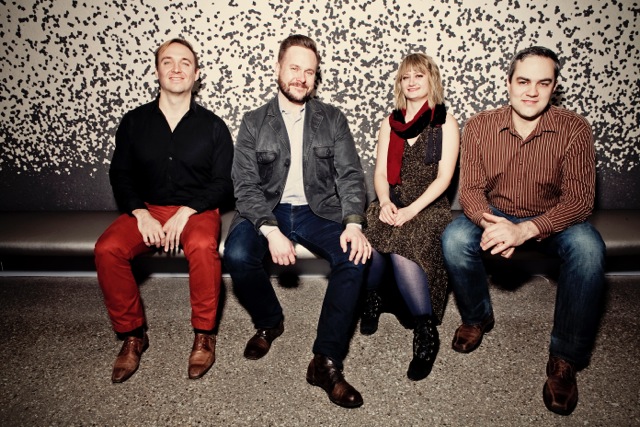Monday, January 12th, 2015

How did Spektral¹s involvement in Behind the Wallpaper come about, and is there anything to keep in mind or listen for when we hear it February 23?
Behind the Wallpaper came about like the vast majority of our commissions do…we were keen to work with a specific composer. Alex Temple, who is based in Chicago, and has an uncanny knack for uncovering the oblique, the humorous, and even the sublime through the idiom of pop musics. While she’s hip to Lachenmann and Ligeti, etc etc etc, Alex doesn’t rely on a bevy of extended techniques to create anticipation and the feeling of something new. As a performer, it’s a wondrous thing, to see a score that doesn’t look like the blueprint for the next particle accelerator, and yet has the audience (and the players) buzzing long after the show is over. That isn’t to say we don’t thrive on those kinds of pieces. It’s just that Alex has found a peculiar, devastatingly honest way of delivering music.
Lyrically, Behind the Wallpaper seems to be dealing a lot with disorientation, altered perception and ideas of self and other. How do you and Julia bring out those threads in your performance?
Grab any Julia Holter record (seriously go buy them all right now), and you’ll see what Pitchfork and the rest are all hot and bothered about. Her singing is intimate and unadorned by affect, and you can’t help but find yourself immersed in the poetry, even if you’re someone like me that typically doesn’t “hear” lyrics. Behind the Wallpaper is a text-driven piece, in my opinion, and while the instrumental writing is deft and inseparable from the whole, the listener will discover the piece as Julia sings each line. It’s a mysterious little suite, and those in the audience at Liquid Music are in for something singular.
Spektral Quartet are consistent proponents of music by contemporary composers. Do you see any stylistic or ideological through-lines between the composers you work with?
That’s a great question, and one which requires more ex-post-facto thinking than anything because we don’t intentionally tout one flavor of new music over another. Doing my best to speak for the group, I’d say we are drawn to virtuosic writing that shows a deep knowledge of the individual instruments, but stretches what seems possible. More specifically, and with no good way to articulate this, our hearts and brains go all aflutter for any piece that has something new to say. Not a new set of techniques, per se, but something we can bring into a room full of listeners and feel like we’ve offered them (and ourselves) something that fires a new neuron or two. We feel really fortunate to live in a city like Chicago, which is lousy with creative compositional talent, and also to be able to collaborate in the near future with folks like George Lewis, Augusta Read Thomas, and Anthony Cheung.
Can you speak about the way you like to program music?
Since we launched this group in 2010, we’ve been offering our Chicago season through the architecture of what we call Sampler Packs. We perform single movements and shorter works (often commissioned for each concert) that resembles more of a setlist than a typical concert hall program. Our mission as an ensemble is to play as much of music across the eras and generations as we can, and to find the conversations and parallels that arise when these pieces are played back-to-back. So for us it’s less of a binary, new vs. old, style of programming than one in which the listener will be exposed to a cluster of different music/genres/styles…and hey, if you don’t like the one we’re dishing you now, wait five minutes and we’re on to the next.
Finally, the big question: what is classical music to you?
I feel like my answer to this will inevitably be the subject of some new-music blog piece, and the dozens of vengeful comments that will follow it. That aside, classical music to me, and me alone, refers more to these historic instruments on which I/we play than any encapsulating genre title. I am in feverish love with performing Bartók and Brahms and Beethoven and would be a husk of a man without them. I relish the smell of 18th century varnish, and well-worn sheet music, and dubious folding stands, and the acoustics of the grand old concert halls. In equal measure, I am flabbergasted and grateful that I was lobbed into an era in which the term “classical music” has such limitless scope, and the composers to make it so. Let the academics have a donnybrook over what pieces deserve to be called “classical.” Me…I have to go practice sub-harmonics.